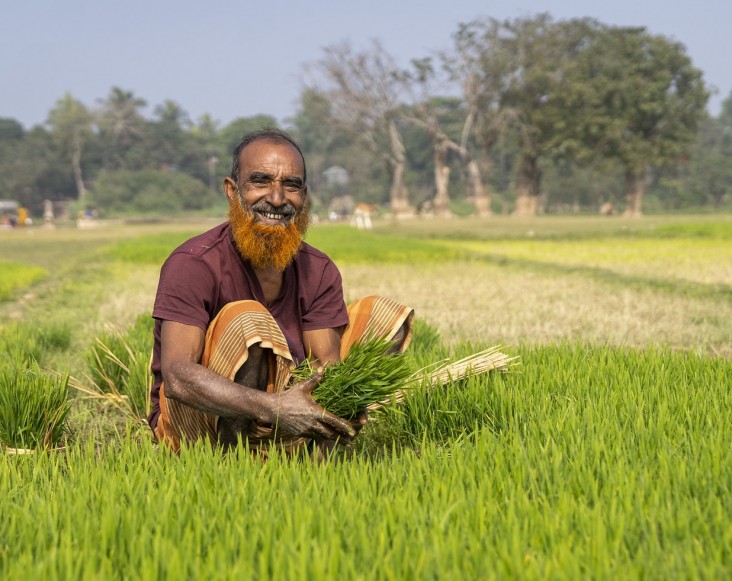AGRICULTURE AND FOOD SECURITY

Dhaka, 29 July, 2020: Bangladesh is the most densely populated country in the world with a population of over 165 million and a projected population, based on current growth trends, of well over 200 million by 2050. This demographic burden places tremendous economic, social and environmental strain on the country and dramatically affects its ability to provide for its citizens.
USAID partners with the Government of Bangladesh on development activities to improve the availability and access to nutritious, domestically produced foods. Under the United States Global Food Security Strategy, U.S. Government’s Feed the Future (FTF) activities improve productivity and agricultural diversity in targeted areas of southern Bangladesh and enhance private sector competitiveness by promoting economic growth, good corporate practices, and supply chain development to benefit poor farmers and businesses. In addition, USAID assistance improves the formulation and implementation of food policy in Bangladesh through research, monitoring, training, and coordination within government agencies. USAID’s assistance contributes to advancing the U.S. vision for a free and open Indo-Pacific.
Productivity
USAID leverages science, technology, and innovation to support research that develops and promotes climate smart technologies to maximize impact on agriculture sector growth. USAID supports public and private extension services to deliver information to farmers and fishers, and integrates nutrition-sensitive and gender-inclusive messages in their work.
Diversification
USAID interventions work to diversify sources of income includes broadening the varieties of plant, fish, and animals raised on the farm, adopting post-harvest practices and intermediate level processing, as well as promoting off-farm income. USAID works closely with the public and private sectors to identify market opportunities and strategies for expanding the production of new and underdeveloped crops that have the potential to increase household incomes, improve nutrition, and contribute to greater women’s economic empowerment.
Market System
USAID programs upgrade technology and processes to improve the flow of market information and ultimately raise overall food and non-food value chain competitiveness. This complex system includes working with the production systems, end markets, support services such as financial and business development services and mechanization, value chain governance, the natural ecosystem, and the socio-cultural context. Facilitating greater functionality of Bangladesh’s market system will lead to sustainable agricultural development that will reach scale through private sector investments.
USAID activities look at the mechanics of the entire value chain to identify constraints. This complex system includes production systems, supply chain, end markets, support services (such as financial, business development services, transportation, and mechanization), value chain governance, the natural ecosystem, and the socio-cultural context. Greater functionality of the market system will lead to sustainable agriculture development that can be scaled up through private sector investment.
Women’s Empowerment
Fundamental to sustainable and inclusive economic growth, including improved crop yields, is the empowerment of women. USAID interventions promote women’s empowerment at the firm, community and household level, which will include behavior change messaging to both men and women in these organizational units. USAID addresses gender gaps and creates opportunities for women to participate actively in the economic activities within the industries, sectors, and companies which this project will support.
Private Sector Competitiveness
USAID improves the competitiveness and growth of selected private sector industries to increase job opportunities for the poor away from the farms. USAID improves private sector competitiveness by enhancing the business enabling and policy environment, boosting relevant skills of men and women in the workforce and management, promoting implementation of quality standards and quality management systems, improving marketing capabilities, increasing business productivity, and promoting increased access to financial services.
Enhanced business enabling environment
USAID helps the Government of Bangladesh modernize and improve the efficiency of its customs operations and make it easier to do business, increase national competitiveness, and stimulate economic growth. USAID provides technical assistance to reduce non-tariff barriers to trade, including revising relevant policies, regulations, and procedures.
Results
In 2019, USAID programs in Bangladesh:
- Supported over 225,000 farmers, who applied technologies in new and improved agronomic practices, including irrigation, livestock management, and pest and disease management.
- Leveraged $2.2 million to improve business performance, benefiting high-value crops producers.
- Enabled 75,000 women to apply improved management practices or technologies for activities on and away from the farm.
Read More
.

